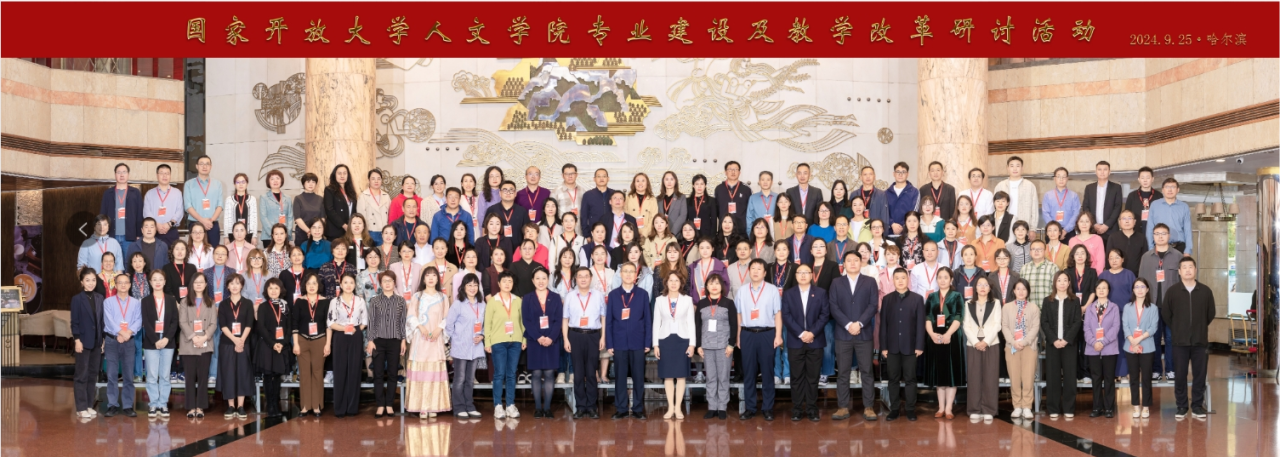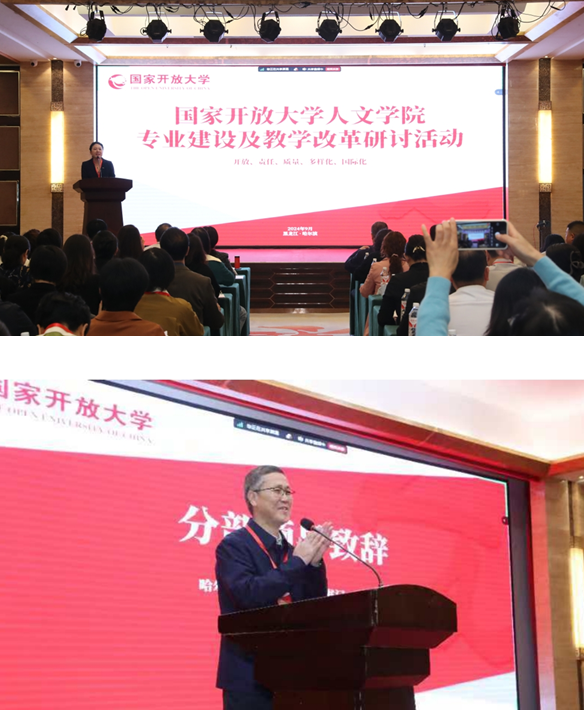 To implement the guiding principles of the Third Plenary Session of the 20th Central Committee of the Communist Party of China (CPC) and meet the needs of building a leading country in education and the transformational development of open universities, the School of Humanities at the Open University of China (OUC) organised a grand teaching research workshop on specialty development and teaching reform in Harbin from 24 to 27 September 2024.
To implement the guiding principles of the Third Plenary Session of the 20th Central Committee of the Communist Party of China (CPC) and meet the needs of building a leading country in education and the transformational development of open universities, the School of Humanities at the Open University of China (OUC) organised a grand teaching research workshop on specialty development and teaching reform in Harbin from 24 to 27 September 2024.
The event aimed to gather the collective strength and wisdom of the OUC education system to enhance the interest, applicability, and appeal of majors related to humanities, to strengthen the synergy and soft power of the education system in collaborating to promote Chinese culture, and to better the top-level design and systematic planning for teaching reforms related to professional talent cultivation. The discussions targeted at studying and exploring new ideas and methods for reform and development, with a focus on creating excellence and improving quality through approaches such as "Chinese + Media," "Intelligence + Humanities," and "Immersive Team Live-Streaming Teaching." This initiative is set to propel the high-quality development of humanities education within the open university system. The event was presided over by Han Yi, dean of the OUC School of Humanities, with a welcome speech delivered by Bai Baoyan, president of Harbin Open University (OU).

The workshop focused on the core theme of reform, including listening to a special report on reforms from the headquarters, exchanging reform experiences from various branches, discussing interdisciplinary teaching and research across universities, and learning from Harbin's cultural and tourism promotion strategies. Participants also engaged in specific workshops on the creative design of professional talent cultivation programmes and enrolment promotion, as well as a team live-streaming teaching workshop held at Xiao Hong’s former residence.
Gu Xiaohua, director of the Academic Affairs Department at the headquarters; and Li Wei, dean of the Learning Resources Department, delivered special reports on the overall strategy for teaching reform, and resource development and application in open universities in the new era, as well as application data analysis. Liu Jianguo, secretary of the Party Committee of Harbin OU; Zhu Xianbin, vice president of Anhui OU; and Wang Tao, vice president of Sichuan OU (represented by Zhao Hui), shared their experiences on reform explorations respectively on the topics of AI-driven learning resource development and application, the "3541 Working Method" to improve the quality of theses, and examination paper review and evaluation through digitalisation. Liu Dongying, a level-two professor from Heilongjiang University; and Zhang Guihai, director of Harbin Ice and Snow Culture Research Institute, were invited for interacted exchanges with the teachers of the educational system on successful interdisciplinary teaching and research in universities, and the successful operation of "Erbin Fever" cultural tourism. Han Yi delivered a keynote report titled “Promoting High-Quality Development of Humanities Education at the Open University through Team Collaboration and Teaching Reform”, covering the four dimensions of international context, national strategy, the OUC role, and a difference the School of Humanities can make.
Liu Dongying delivered a captivating presentation titled "New Media Dissemination of Classical Poetry Chanting," which significantly stimulated the interaction among the attending teachers. Professor Lyu Jie from Xi'an OU performed an impromptu dance to the chanting, while Han Yi spontaneously composed a poem. This harmonious blend of poetry, music, and dance vividly showcased the unique charm of humanities education. After that, the entire group of teachers collectively chanted "Abundant Harvest, Hymns of Zhou, the Book of Songs", celebrating the 75th anniversary of the founding of the People's Republic of China and wishing for its enduring prosperity, which brought the atmosphere to a climax.
Bai Chenyang, a teacher at the headquarters; along with Ren Yandong, Zhu Songlin, and Zhang Yan, teachers from Harbin OU, as well as Zhang Chao, Sun Shijing, and Zhan Yongbo, teachers from other city-level open colleges gave an immersive team live-streamed lesson titled “Pursuit and Perseverance in a Wandering Life: Entering the World of Xiao Hong” at Xiao Hong's former residence by the Hulan River. This marked the beginning of the teaching reform for humanities programmes at the OUC. This online-offline immersive teaching method showcased the characteristic of team teaching in open universities, leaving a profound impact on the participating teachers. Many attendees expressed their eagerness to join the teaching reform of “giving the same lesson” initiated by the School of Humanities nationwide using this immersive team-teaching model.
Although the 2024 National Grand Teaching and Research Event hosted by the School of Humanities has come to an end, it has also inaugurated a new chapter of continuous teaching reform of the education system in line with the times. The School of Humanities thoughtfully designed a satisfaction survey for the event, and the results show an impressive satisfaction rate of 98.77%.

At the event, two teaching central groups were established, one for Chinese language-related majors and the other for media-related majors. Han Yi, along with President Bai Baoyan, as well as Zhu Xianbin, Zhang Li, and Peng Xumei, three vice presidents coming respectively from the open universities of Anhui, Harbin, and Dalian, jointly presented appointment letters to the members of the central groups. Professor Liang Ertao from Henan OU gave a speech on behalf of the central groups.
More than 130 participants attended this teaching and research event, including deans of relevant schools from 41 local open universities, key faculty members from the Chinese and media departments, and leaders from 23 city-level open colleges.
By OUC